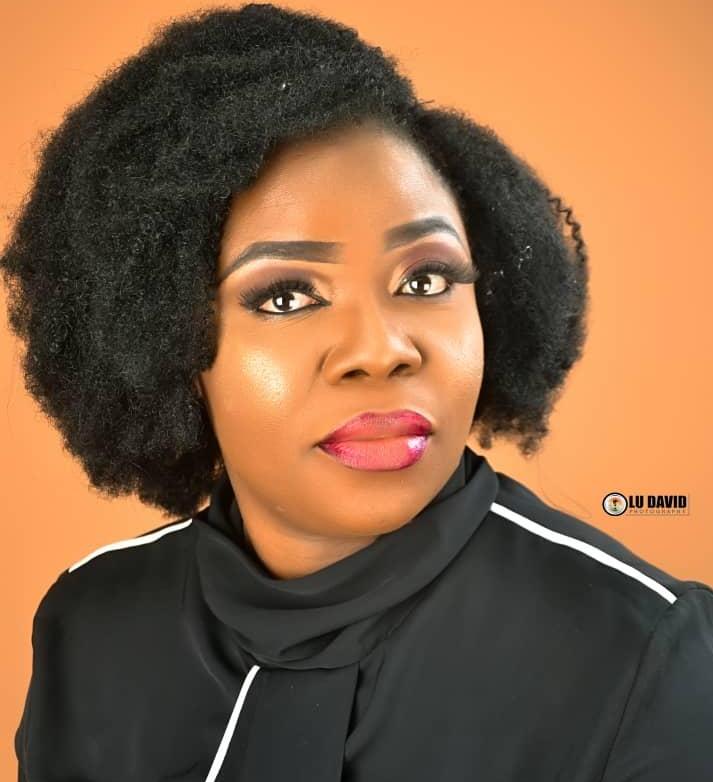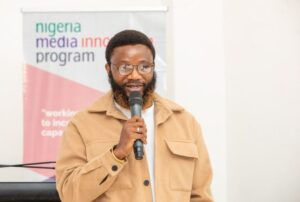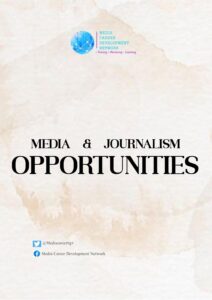Chevening Scholarship alumna, humanitarian and multiple award-winning journalist, Folashade Adebayo is the Communication Officer for UNICEF Nigeria, Maiduguri Field Office in Borno. In this role, Adebayo manages donor visibility, media partnerships and strategic communication for UNICEF’s humanitarian interventions across northeast Nigeria.
Prior to this role, she served as Reporting and Communication Officer for Education programmes with UNICEF Nigeria in Maiduguri, north-east Nigeria. Before joining UNICEF in 2019, she founded www.coursefunds.com, a web resource that harnesses global and local scholarship opportunities for indigent but brilliant Nigerians and West Africans.
Adebayo was a 2017 Chevening scholar and a former International Postgraduate Student Ambassador with the University of Aberdeen, United Kingdom. With a 14-year journalism experience researching, reporting, writing and editing in two of Nigeria’s foremost newsrooms, ( Senior Writer, Tell Magazine and Senior Correspondent, The Punch Newspaper) , she covered news stories, special features as well as investigations in the science, education, and health beats. She was a finalist at the coveted 2016 CNN/Multichoice African Journalists of the Year Award, the most celebrated award platform for journalists of African descent.
She was also the winner of the 2016 Conflict-Sensitive Reporter of the Year for Diamond Awards for Media Excellence as well as the 2015 Child-Friendly Reporter of the Year on the same platform. In 2014, Adebayo was the Science Journalist of the Year on the platform of the Nigerian Academy of Science and the 2012 Foreign News Reporter of the Year for the Nigerian Media Merit Awards, among other awards and nominations.
She earned an MSc in International Relations/International Law from the University of Aberdeen, the United Kingdom, and a BSc in Journalism from the Lagos State University, Lagos State, Nigeria.
See full Work history, Educational qualifications
Questions and Answers on her career journey so far below.
From working in Magazine to Newspaper and now as a Communication officer, how smooth have the transitions been from one work schedule to the other?
I would call it a smooth transition because of the overlap of long work hours, fieldwork, unpredictable schedules, multiple work partners and requests as well as the strategic thinking both roles demand. Being a journalist prepared me for my current role. It is perhaps the most fitting background for this role. A journalist is constantly thinking of her next story and it is the same with a Communication Officer working in the humanitarian sector. How best can I represent my organization’s brand? How best can I represent the people my organization serves? A journalist is as good as her last story; so, she is constantly innovating, constantly researching and asking questions, constantly looking beyond the face value. Both roles are uniquely different, but the transition has been smooth because journalism and humanitarian work is about people. There have been few surprises and lots of learning. But the core hard and soft skills needed to succeed in any role apply too. Having a nose for news, sound interviewing skills, sustaining partnerships, good writing skills are some of the skills that are relevant to my new role. There is also resilience, a good sense of humour, seeing the big picture, people management and not sweating the small stuff. I would say anyone who has succeeded in journalism would not find the demands of this role daunting.

Many journalists always want to end up in Communication work. What is your advice, based on your experience for preparing for such roles?
This is almost a natural progression for many journalists. It is about knowing what you want, learning all that you can about the role while keeping your eyes open for that opportunity. Anyone interested in the communication field will do well to know what is unique about the role. Journalism is in the public interest, so is communication. It is important to study the intricacies of the communication role you are interested in. I have had some colleagues who wanted to know what a communication strategy or communication plan is. These are unique terminologies and important when attending interviews for communication positions. Check out the online footprints of the organisations you are interested in. Follow the work of people in such positions on social media. Put a lens on job descriptions of the roles and reach out to people you know who have been in such roles if you have questions.
What does it take to work for international organisations like UNICEF which you are working for now?
Nothing more important than empathy and truly caring for children and women. No doubt, UNICEF is a great place to work and impact lives directly. Every role matters in driving results and moving the needle, no matter how small. For every great organization, international or not, the focus encompasses both competence and compassion. It is not only about what we do but how we do what we do. Care, respect, integrity, transparency and accountability are UNICEF’s core values. And no matter how much capacity an individual has, she would not be worth her portfolio if she is deficient in these values. So, when these values are in place, I would just add that a personal commitment to excellence is important. It is great to deliver on your workplans, but make sure you are not doing the minimum. 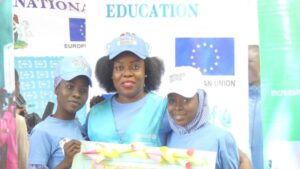
I see my role as an opportunity to be the difference and make a difference. I recently read what the Director-General of the World Trade Organisation, Dr Ngozi Okonjo-Iweala had to say about success. For her, it is about getting out of bed every day and running to work. It is as simple as that. It is about showing up, without fail, whether as a result of truly enjoying the job or a good old commitment to the job. There is a tendency to see the job as having arrived, but I kid you not, it is the beginning. The short-term impact of your role is lived out right under your nose by vulnerable children and women, let alone the long-term benefit of a child succeeding and helping others like her or him succeed. I am talking about a cycle of value that is both immediate and long-term. As a humanitarian, nothing trumps hard work, being compassionate and having integrity.
What impact has having a higher educational qualification had on your career?
It has obviously given me options to take my career to another level. Experience matters when job hunting but a higher educational qualification adds value if it is well-earned. For me, a Master’s in International Relations and International Law, exposed me to international politics, global and regional conflict patterns, history and diplomacy. It certainly played a role with my current position because I had practised journalism for 13 years before I had the opportunity to attend graduate school. And it is not just about getting the job but also performing on the job. The humanitarian field is a small but truly international environment. Collaborative projects and missions happen almost every day. I believe my postgraduate qualification in International Relations/International Law contributes to effective coordination, understanding of contexts and managing partnerships.
How can journalists deploy their experience in initiating personal projects like Coursefunds.com which you founded?
Coursefunds.com was an initiative I embarked on after my return to Nigeria. The vision is to empower others with information regarding scholarship opportunities with which they can fund higher education. I am a Chevening Scholarship alumna who would not have been able to afford higher education in the United Kingdom. I can say that God used the postgraduate scholarship opportunity to burnish my perspectives and of course my life. There is no understating the power of a scholarship in pursuing one’s dreams. It could make a difference to an individual, a family and society.
The coursefunds.com platform basically points others to scholarship sites and schools and how to put applicants can put their best foot forward throughout the entire process. There are levels of scholarship opportunities, while some are well-known and oversubscribed, others are little known and exist within departments and schools. I believe there are opportunities out there for indigent but brilliant Nigerians and Africans to study and grow. And anyone who wants to initiate personal projects can do the same. Journalists can write books or blogs. Journalists can institute scholarships in primary schools for the most improved children at the end of a term. Impact is impact. There is nothing like high value or low-value impact. Journalists can collaborate to create apps that provide solutions to a problem they encountered. It only takes a recognition of how much one can truly do and the willingness to pursue it.
READ ALSO: MY JOURNALISM TO ENTREPRENEURSHIP STORY – ADEBAYO
What is the place of winning awards in career progression?
It is good and validating to win awards. It is a natural reward for great journalism and it most certainly has a role to play in one’s career growth. Whether it is a horizontal or vertical career progression, organisations are looking for evidence of excellence and winning awards easily stands vibrant journalists out. What I would caution about is the pressure to win awards. The pressure is real across newsrooms. I like to see good journalism as a journey and not a sprint. What is most important is that one is making progress and consciously honing one’s skills. Like creating time to read and learn from the stories written by others. This can be done by observing what made the stories stand out. Another way is learning the art of interviewing with striking questions. Investing in public speaking, graphics artistry, digital journalism and so on. So, while it is validating to win awards, there are other skills that count for career development that journalists should embrace.
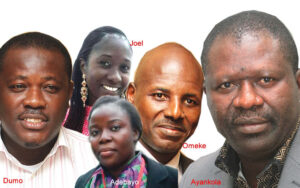
Any other insight you want to share with colleagues against the background of the present disrupted media landscape which many are finding difficult to navigate.
Staying relevant in a digital world is a necessity for any professional. Of course, the media landscape has changed forever. As mentioned earlier, journalists with digital skills are more relevant and able to switch roles whenever the opportunity arises. The good thing is that these skills are mostly affordable and available to learn online. Public speaking, website management, video editing, social media marketing are must-have skills for any professional. For me, it is about constantly developing one’s career to stay relevant in a digitalized world. These much sought after skills will equip journalists to function in and beyond the media.
